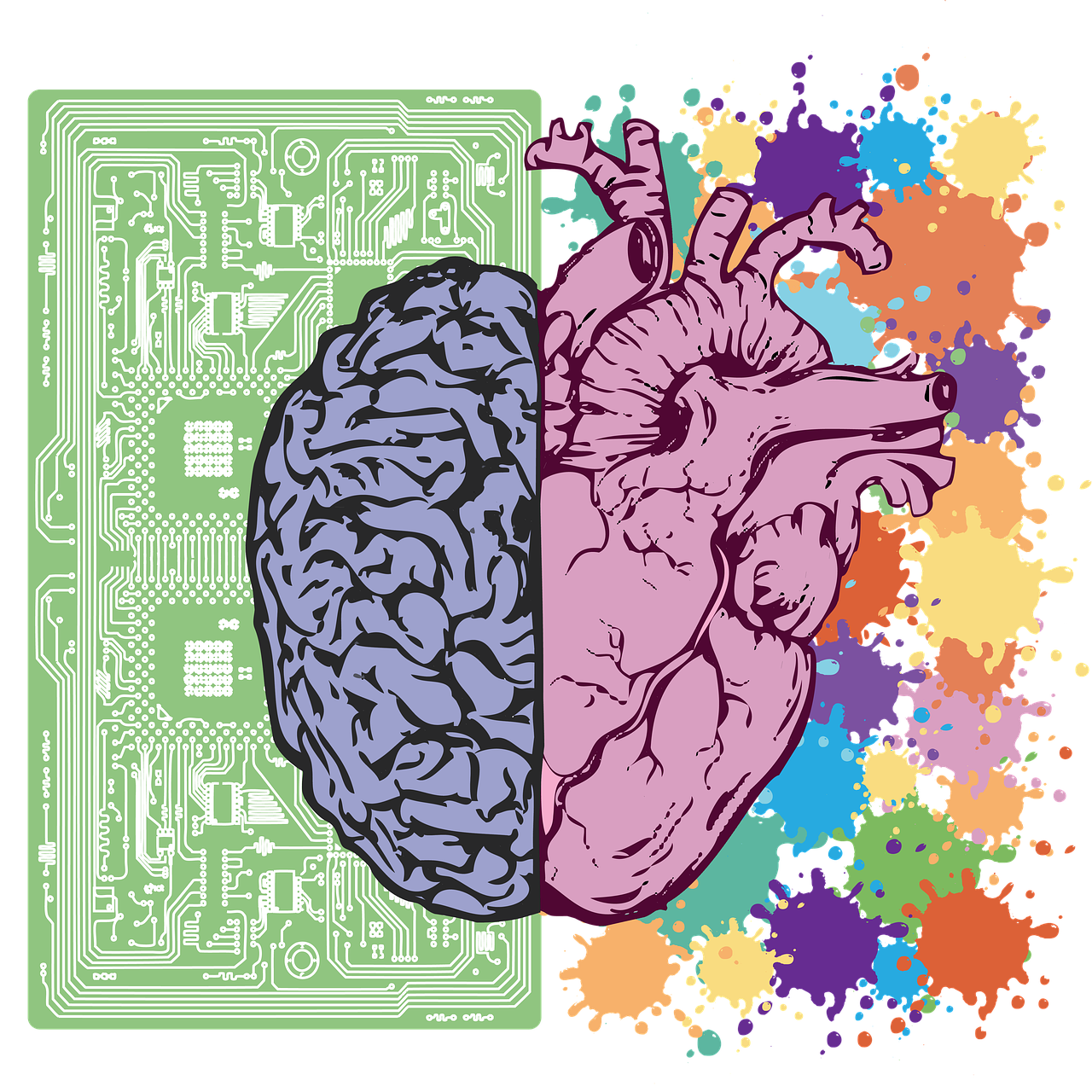Andilocks and the Three Emotions
Getting the relationship with your emotions 'just right'

Once upon a time, there was a kid named Andilocks who wore cool waistcoats and chelsea boots. He had three emotional friends: Anger, Sadness and Compassion.
Andilocks struggled with these relationships - Anger was often 'too hot' and intimidating, Sadness was 'too cold' and difficult to connect to, while Compassion made Andilocks feel weak. Andilocks had the idea that if each of his friends could learn from each other to balance each other out, everyones relationships would be just right!
He introduced Sadness to Anger, but Anger intimidated Sadness. He introduced Anger to Compassion, but Anger mocked Compassion and branded them weak. He then introduced Compassionate to Sadness, but Compassion became overwhelmed by Sadness. Andilocks started to think his friends were stupid. Stupid, because if they could simply learn to connect and learn from one another, everything would be ‘just right’ and they could live happily ever after.
Confession time - Andilocks is a bootleg Goldilocks. Goldilocks! - you know the story - Goldilocks attempted to eat three bowls of porridge, one was too hot, another too cold, and the third bowl was just right!
(The original story is that Goldilocks is an obnoxious old woman who visits the woodland house of three anthropomorphic bachelor bears, but that's a very different story...).
So, while porridge isn't exactly the same as emotion, and you probably don't want to make friends with your breakfast, the 'Goldilocks Principle' may help you understand how to understand and manage your emotions.
Goldilocks Principle

The ‘Goldilocks Principle’ describes how when deciding on what you think is true, it should neither be too logical or emotional - but be 'just right'.
Your brain makes decisions up to 10 seconds before you even become consciously aware of it! (source).
Similarly, your emotional brain automatically weighs the pros and cons many types of information before ‘choosing’ what feeling makes the most sense according to your understanding the world at that time.
To use Goldi'logic - when your emotions become ‘too hot’ they might be difficult to understand and seem irrational. On the other hand, if your emotions are ‘too cold’ then you may feel numb or detached.
As positive and negative experiences both have value: finding the ‘just right’ sweet spot between extremes is often a good strategy. For example, how many people claim to perform better under pressure. They procrastinate for a long time and then, as the deadline approaches, are suddenly able to work hard and complete their task.
But I feel some people can undervalue the wisdom of emotions, and can be rather dismissive of them.
In today's culture, using your emotions to inform your reality is a skill that most people overlook because they place too much emphasis on thinking at the price of feeling. Instead of feeling anxiety, sadness, love etc, they think it.
People often assume that 'thinking rationally' means sacrificing their emotional intuition in to find a positive 'just right' solution. This is an unhelpful misunderstanding because it values thought over feeling. To 'think rationally' is not always a positive thing, but rather a realistic assessment of the issue with the goal of solving the problem if possible and accepting reality if not.
There is no separation of mind and emotions: emotions, thinking, and learning are all linked and can occur harmoniously.
The value of 'just right' is clear, regardless of the vocabulary used, or whether you choose thoughts, emotions, or behaviours to manifest change.
To find your "just right" it's helpful to understand how to develop connections with and between emotions.
Some Emotions Are 'Stupid Friends'
Emotional intelligence is the intersection of heart and head working together.
The problem is that emotions on their own aren’t intelligent. As Andilocks found out - they can sometimes be stupid. But they’re stupid friends. So just what are emotions?
The word ‘emotion’ dates back to 1579, adapted from the French word émouvoir, which translates as “to stir up”. Species developed emotions to help them survive. At least...emotions started simply as survival.
There are societal norms in modern culture about what we can feel, when we may feel it, and how we can express it. This puts alot of pressure on people to control their emotions.
And society does a great job at stirring up ‘negative emotions’ without helping to manage them, while encouraging and forcing us to feel ‘positive' about everyone and everything.
This 'toxic positivity' genuinely saddens and offends me: someone discloses symptoms of depression and are told to think positive. Someone may have suffered a tragedy in their life and are told to look on the bright side!
Positivity, mindset and perspective are hugely important. But you can't live on mental candy. It's unrealistic to be positive all the time. But society often expects you to - smiling is easier and more socially acceptable than explaining why you’re sad.
But interestingly, people who refuse to accept their ‘negative’ emotions are more likely to experience them more intensely. People who allow themselves to experience sadness, pain, and resentment have less signs of mood disorders than those who repress them (read more here).

All of these emotions must be balanced and considered in context; they are required to keep us alive and healthy. But some emotions are easier to contend with than others.
A large part of why people experience anxiety symptoms physically is because they are unable to understand and express their emotions to themselves, before others (psychosomatics).
When complicated experiences are carefully put into words, how we relate to them and how they are represented in the brain changes. They move from the areas associated with stressful emotion, demanding constant physical readiness (amygdala), to the areas associated with detailed comprehension and understanding (prefrontal cortex).
In plain English - the more emotionally articulate someone is, the less they experience distress.
Emotions, your stupid friends, generally have three purposes:

All emotions are survival mechanisms neccesary to provide a sense of continuity in our lives and prepare you for action.
This is why I dislike phrases like ‘negative emotion’: trying to intellectualise your emotions into positive and negative variants alone results in a distorted, over simplified and inaccurate view of reality.
Emotions are neither positive nor negative. Emotions can be helpful (if constructive) or unhelpful (if destructive).
Judging an emotion as positive or negative is a psychological trick (black and white thinking). that keeps you trapped rather than helping you meet the needs of the emotion.
Imagine how you felt about other people was simplifed as 'I love them' and 'I hate them'. No in-between. When you love them, great! life is good. But the moment the person does something stupid (which if they haven't done already, they will) they immediately get moved to the hate category, Then you'd feel anger, sadness, pain and a whole host of 'negative' emotion. Instead of being able to work through it, you'd become stuck and never love them again.
You can imagine how tough it would be for a person who thinks this way to build relationships. But also, imagine all the distress and anxiety that would come from becoming trapped in a hateful cycle!
It is very understandable that sometimes when the emotions are too intense, they can be overwhelming. Instead of black and white thinking, consider that emotions (even 'negative emotions') are an opportunity to learn that you’re not relating to yourself as effectively as you could be.
Our feeling is not there to be cast out or conquered. They’re there to engaged and expressed with imagination and Intelligence
One strategy to is to change how you relate to your emotions from a black and white thinking perspective, to a more balanced one.
You can do this through connecting to yourself instead of disconnecting - your emotions connect you to a deeper part inside yourself instead of abandoning yourself.
Think through your life and reflect on how everything you judged about yourself served a purpose at the time.
Because emotions have needs. And when you are struggling with emotions, it's likely those needs are being unmet.
When exploring your emotions, ask yourself 'what does this emotion need?''
- You feel anger when your boundaries are being violated.
- You feel anxious when you anticipate a perceived threat.
- You feel grief when you recall the love you once had for someone or something that is no longer here.
But some emotions are more powerful than they are ‘positive’: pain is more potent than pleasure. And anxiety more than hope.
So this isn't to say that just feel horrible and let that be the end of it. No, one of the secrets of a well lived live life is the sweet spot between opposed extremes.
Just like Goldilocks, you want to find the spot that's juuust right!
'Just right' = Being Connected
Someone I look up to once told me "you have to arrive at an emotion before you can leave it".
You can find the sweet spot by improving your ability to describe and articulate emotions. As mentioned before, this begins with reframing your relationship to emotions by understanding they have 'needs'.

Many of our emotional problems stem from broad generalisations.
The scale makes emotions more tangible: seeing emotions as having a desire and attempting to offer you information that moves you towards meeting a need.
For example, maybe I feel anger as someone is crossing my boundaries. I could shout and have an argument. Or, maybe when I ask what anger needs I actually realise I'm also pretty anxious. I realise I'm scared that the person is pushing me to do something I don't feel comfortable with. So then I understand that my anger is my way of 'protecting' myself from my fears. Because I feel anger doesn't mean I'm a bad person. But shouting this at someone isn't always helpful, I realise that anger is being a stupid friend trying to meet a need by protecting me. So instead I need to communicate to the person that their behaviour is making me uncomfortable and try to work out a solution that involves setting healthy boundaries.
(...easier said than done!).
The scale idea forces you to evaluate what is truth, but also value the emotions on opposite ends of the spectrum in order to find the right balance. This forces you to think carefully and methodically rather than in black and white.
You cannot control your feelings - you feel what you feel, but you must learn to relate to all of them.
This requires practise and effort, but it is more accurate and productive than being emotionally agitated by overgeneralizations, and it can be used as an antidote to black and white thinking.
Living Emotionally Ever After...

Andilocks used everything he had learned to realise that all three friends were trying to help him in the only way they knew how. Anger was afraid that someone would cross their boundaries. Nobody noticed their strength, so Compassion felt invisible. Sadness felt disconnected from everyone around them.
Andilocks learned that the ability to relate to your emotions comes through a 'need' not a desire. That his emotional friends were his greatest teacher. He didn't realise he was neglecting all of his friends needs and abandoning them. (I love a good plot twist).
If mental illness is the inability to regulate perception/action/emotion/cognition in accordance with desired values. Then your mental health requires a “Goldilocks” solution to allow you to regulate your experiences.
Unmet emotions, I believe, underpin a major part of all mental health issues. Perhaps the negative/unhelpful ways people have learnt to deal with emotions are what we call 'mental health issues' and 'mental health disorders'.
This would mean 'the cure' would be to approach the emotion and re-connect with their needs as they express them.
Your emotions are just that. They’re yours. All of your emotions are trying to help you survive. Some are more constructive, while others are more stupid.
Finding a 'just right' balance of thought with action, empathy but with structure. And accountability with responsibility, Allows you to build the capacity to observe, relate, assess, and respond calmly to life...most of the time.
But be kind to yourself - Therapists don't get it right all the time either!
Oh, and Andilocks lived emotionally ever after!

Getting Started
To arrange an appointment, you can email me at andrew.kidd@firstpsychology.co.uk or contact the First Psychology Services Team on 0141 404 5411.
